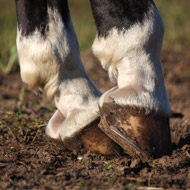Horse study unlocks clues to ageing tendons

Damaged tendons in younger horses were found to contain more of the proteins used in healing than the damaged samples from old horses, suggesting that healing also slows with age.
Scientists from the University of Liverpool have examined the mechanisms that cause ageing in the tendons of horses, opening up the possibility of better treatment for humans.
The study used samples taken from young and old horses, which have similar tendon properties to those in human beings. Researches performed a range of tests to profile the types, quantities and proportions of proteins present in the tendon.
The scientists discovered marked differences in the proteins in young and old horses. Professor Peter Clegg, chair of musculoskeletal biology, explains: "Injured tendons are extremely painful and limiting in humans and we know that this increases as we get older.
"We're now starting to get to the 'why' of this process by showing that the proteins produced by the cells to repair damage alter as we get older."
The research also found that certain fragments of protein appear in greater quantities in older horses, suggesting that they are released as the tissue is damaged over time.
In comparison, damaged tendons in younger horses were found to contain more of the proteins used in healing than the damaged samples from old horses. This suggests that healing also slows with age.
Professer Clegg added: "This now opens up the possibility of better treatment and prevention strategies to address tendon injuries in both man and veterinary specifies such as the horse."
The study, ‘Proteomic analysis reveals age-related changes in tendon matrix composition, with age-and injury-specific matrix fragmentation’, was published in the Journal of Biological Chemistry.



 The BSAVA has opened submissions for the BSAVA Clinical Research Abstracts 2026.
The BSAVA has opened submissions for the BSAVA Clinical Research Abstracts 2026.